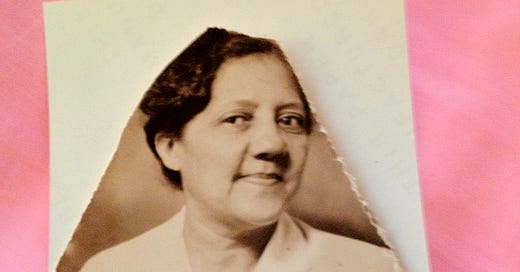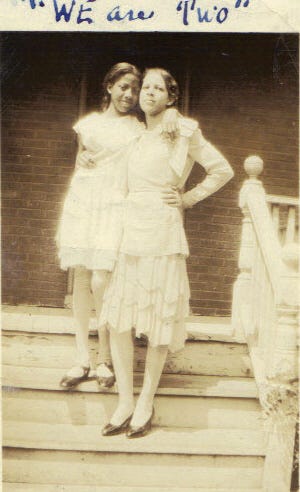Meet My Maternal Grandmother
A beautiful woman who fought for civil and voting rights for all and taught me to never miss a chance to vote.
Issue #707 The Choice, Tuesday, August 20, 2024
Please share and subscribe to help us grow this publication.
If you like us, REALLY like us, please click the “Like” button at the end of this post!
We appreciate your support!
Mrs. Gussie Adele Smith Russell, 1898 - 1965
When I was born in 1950, I had four grandparents. My maternal grandfather, who I met only once when I was less than one year old, died in 1951 at the young age of 54. He and my maternal grandmother moved during the Great Migration to East Chicago, Indiana, so that he could work in the steel mills. Working that job, breathing toxic fumes, is what killed him.
I also met both of my paternal grandparents, who lived in Fort Smith, Arkansas, just once in 1957. My paternal grandfather worked as a chef on the railroad to support his thirteen children, and my paternal grandmother had her hands full raising those thirteen children. My father was the 12th of the 13 children, so by the time my sisters and I came along, we were blessed to meet his parents, who died one year and two years after our only meeting.
My maternal grandmother is the only one of my grandparents I knew well. She was born at the end of the 19th century in Eufaula, Alabama. After graduating high school, she decided to leave the cotton fields and enroll in the journalism program at Tuskegee Institute (now Tuskegee University). The white supremacists in her town didn’t just get mad about her decision. They burned crosses on her family’s lawn. She went to Tuskegee anyway, becoming the first and only person in her immediate family to graduate from college.
She was also a suffragette, working to get women the right to vote. She always fought against the wrongs of the system in which she lived.
My maternal grandparents had three daughters. My grandmother wrote columns for the local Black-owned weekly newspaper and sold dresses from their house, as Black women were not allowed to try on clothes in the stores. Black people were also not allowed to try on shoes. My mother told me that her mother would trace around her foot on brown wrapping paper, cut out the foot drawing, and take that to the store to buy the right size.
My mother was the 2nd of the three daughters. When my mother was ten years old, her older sister Eleanor was thirteen and was hit in the head by a basketball in gym class, suffering what today would be a minor concussion. My grandparents rushed their eldest daughter to the only hospital in East Chicago, Indiana, but the white hospital refused to admit her.
My grandparents tried to drive her to Chicago, 30 miles away, to the Black hospital, but my 13-year-old aunt died before they got there.
My Grandmother and my Aunt Eleanor, 1934
These lived experiences, including growing up and picking cotton in the segregated South and living in the Jim Crow North, shaped the politics of my grandmother.
When I was about five, and my grandfather had died, my parents moved my grandmother to Detroit to help watch us after school while they worked. My grandmother never learned to drive, so we walked everywhere. I remember her taking us to the movies to see “Ben Hur.”
When her sisters, who were also part of the Great Migration, often came to visit from Chicago, they would sit around the dining room table and talk about politics. Endlessly.
After school, she would drag me with her for block after block, registering people to vote. Then, when we finally got back to her house, she would fix me a toasted cheese sandwich and a glass of Faygo Red Pop. She never had a toaster; she toasted bread in an iron skillet.
After that, she took out her big black phone book, held together with rubber bands, and made call after call to encourage people to vote and get involved in local politics.
This was when Detroit was still primarily white.
My grandmother died in August 1965, a few months before her 67th birthday and just before the passing of the 1965 Voting Rights Act.
I never forgot those experiences or hearing the stories of her youth. I also never forgot how my parents were also politically active when I was growing up.
The year before I turned 21, the voting age was reduced from 21 to 18, and I was so excited to cast my first vote. I have never, ever missed voting in any election since then.
Thank you, Gussie Adele Smith Russell. I have never forgotten you or what you taught me about fighting for what is right.
Every vote I make, I make in your honor.
Our paid subscribers are encouraged to comment on this post.
Let’s discuss these facts in our community on Substack Notes. You can also read other Substack publications without subscribing to them when you join Notes.
This post is free to read for three days. To have access 365/24/7 to our full archive, comment on our posts, and financially support “We Are Speaking” for no more than $5 per month, please subscribe at the paid level. You will receive a 7-day FREE trial!






